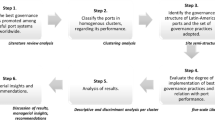Abstract
Transparency remains an under-analyzed topic in port research, and previous research has shown that port decision-making and governance reporting are inconsistent across countries. While transparency might be imposed through legislation or voluntarily adopted, effective transparency also includes (a) an organization’s willingness to consistently communicate and make transparent information available to internal or external stakeholders and (b) the stakeholder`s expectations on the visibility and verifiability of information. This paper focuses primarily on the second of these, extending an earlier study that explored the availability of information accessible to the public and port stakeholders through a port’s most public face—its website (Brooks et al. 2020). This research examines a subset of 27 governance variables from Brooks et al. (2020), who explored 59 separate items to identify transparency practices by ports, revealing uneven levels of port transparency. The scope is to identify what different port stakeholders expect to be visible and readily available in terms of board meeting openness, board director conflict of interest, board provided information, and board reports/publications. Stakeholders also provided their perceptions of how trustworthy board reporting was perceived. The data set includes 134 usable responses from 38 countries and this paper analyzes similarities and differences across stakeholders and countries. The responses from the survey are also considered in the light of the results from Brooks et al. (2020) and the extent that ports currently make these variables visible and available. The study concludes by discussing a further research agenda towards a more transparent and thus better port industry.

Source: Authors

Source: Authors
Similar content being viewed by others
References
Albu OB, Flyverboom M (2019) Organizational transparency: conceptualizations, conditions, and consequences. Bus Soc 58(2):268–297
Berglund T (2014) Corporate governance and optimal transparency. In: Forssbaeck J, Oxelheim L (eds) The Oxford handbook of economic and institutional transparency. Oxford University Press, Oxford, pp 359–370
Bernstein ES (2012) The transparency paradox: a role for privacy in organizational learning and operational control. Adm Sci Q 57(2):181–216
Brooks MR (2017) A new direction or stay the course? Canada’s port-specific challenges in addressing the port reform program of the 1990s. Res Transp Bus Manag 22:161–170
Brooks MR, Pallis AA (2012) Port governance. In: Talley W.K. (ed.). Maritime economics – a Blackwell Companion. Walden MA: Wiley–Blackwell, 232–267
Brooks MR, Cullinane K (2007) Devolution, port performance and port governance (Research in Transport Economics Volume 17). Elsevier, Oxford
Brooks MR, Cullinane KPB, Pallis AA (2017) Revisiting port governance and port reform: a multi-country examination. Res Transp Bus Manag 22:1–10
Brooks MR, Knatz G, Pallis AA, Wilmsmeier G (2020) Transparency in governance: seaport practices, Port Report No 5. https://www.porteconomics.eu/portreport-no-5-transparency-in-governance-seaport-practices/
Eijffinger SCW, Geraats PM (2006) How transparent are central banks? Eur J Polit Econ 22(1):1–21
European Sea Ports Organisation (ESPO) (2016) Trends in EU Port Governance 2016. ESPO, Brussels. https://www.espo.be/publications/trends-in-eu-ports-governance-2016
Fenster M (2015) Transparency in search of a theory. Eur J Soc Theory 18(2):150–167
Finel BI, Lord KM (1999) The surprising logic of transparency. Int Stud Quart 43(2):325–339
Geerts M, Dooms M, Stas L (2021) Determinants of sustainability reporting in the present institutional context: the case of port managing bodies. Sustainability 2021 13:3148
Hahn R, Reimsbach D, Schiemann F (2015) Organizations, climate change, and transparency: reviewing the literature on Sustainability Disclosure. Organ Environ 28:80–102
Heald D (2006) Varieties of transparency. In: Hood C, Heald D (eds) Transparency: the key to better governance? Oxford University Press, Oxford, pp 23–45
Hood C (2006) Transparency in historical perspective. In: Hood G, Heald D (eds) Transparency: the key to better governance? Oxford University Press, Oxford, pp 3–23
Hultman J, Axelsson B (2007) Towards a typology of transparency for marketing management research. Ind Mark Manage 36(5):627–635
International Association of Ports and Harbors (IAPH), (20201). WPSPS Covid-19 Guidance Document for Ports. Antwerp: IAPH
Knatz G (2017) How competition is driving change in port governance, strategic decision-making and government policy in the United States. Res Transp Bus Manag 22:67–77
Maciag M (2017) Most Special Districts Lag in the Transparency Department. https://www.governing.com/archive/gov-special-districts-transparency-pirg.html. Accessed September, 8, 2021
Michener G, Bersch K (2013) Identifying transparency. Information Polity 18(3):233–242
Notteboom T, De Langen PW, Jacobs W (2013) Institutional plasticity and path dependence in seaports: interactions between institutions, port governance reforms and port authority routines. J Transp Geogr 27:26–35
Notteboom T, Parola F, Satta G, Penco L (2015) Disclosure as a tool in stakeholder relations management: a longitudinal study on the Port of Rotterdam. Int J Log Res Appl 18(3):228–250
O’Brien P, Pike A, Tomaney J (2019) Governing the ‘ungovernable’? Financialisation and the governance of transport infrastructure in the London ‘global city-region’. Progress in Planning 192. https://doi.org/10.1016/j.progress.2018.02.001
Parola F, Satta G, Penco L, Profumo G (2013) Emerging Port Authority communication strategies: assessing the determinants of disclosure in the annual report. Research in Transportation Bushiness and Management 8:134–147
Schnackenberg AK, Tomlinson EC (2016) Organizational transparency: a new perspective on managing trust in organization-stakeholder relationships. J Manag 42(7):1784–1810
Transparency International (2021) Corruption Perceptions Index 2020. Transparency International
Ubbels B (2005) Institutional barriers to efficient policy intervention in the European port sector. IATSS Research 29(2):41–49
Valentinov V, Verschraegen G, Assche K (2019) The limits of transparency: a systems theory view. Syst Res Behav Sci 36(3):289–300. https://doi.org/10.1002/sres.2591
Verhoeven P, Vanoutrive T (2012) A quantitative analysis of European port governance. Maritime Economics & Logistics 14(2):178–203
Wehmeier S, Raaz O (2012) Transparency matters: the concept of organizational transparency in the academic discourse. Public Relations Inquiry 1(3):337–366
Williams CC (2005) Trust diffusion: the effect of interpersonal trust on structure, function, and organizational transparency. Bus Soc 44(3):357–368
Author information
Authors and Affiliations
Corresponding author
Ethics declarations
Conflict of interest
The authors declare no competing interests.
Additional information
Publisher's note
Springer Nature remains neutral with regard to jurisdictional claims in published maps and institutional affiliations.
Rights and permissions
About this article
Cite this article
Brooks, M.R., Knatz, G., Pallis, A.A. et al. Visibility and verifiability in port governance transparency: exploring stakeholder expectations. WMU J Marit Affairs 20, 435–455 (2021). https://doi.org/10.1007/s13437-021-00250-2
Received:
Accepted:
Published:
Issue Date:
DOI: https://doi.org/10.1007/s13437-021-00250-2




